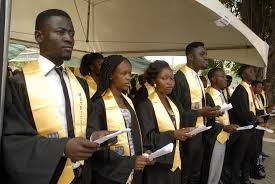
Nineteen-year-old Miss Adepeju Okunuga, a final year Accounting student of the Babcock University, Ilishan Remo, Ogun State, was not born with a silver spoon in her mouth.

However, Okunuga, who is the first child of her parents, is happy with what her parents are able to provide for her upkeep.
Interestingly, Okunuga, whose father is a lawyer and mother an insurance practitioner, is known among her peers on campus as a tailor, better still, a fashion designer.
Okunuga, who completed her secondary education at the Federal Government Girls’ College Odogbolu, Ogun State in 2010, learnt the art of fashion designing during her first two summer breaks as an undergraduate.
Similar Posts:
She says, “I started learning how to sow from my 100 level summer break which lasted for four months, and by the time I got to my third year, I had perfected the skill of making clothes.
“I did not go to any fashion designing school. It was just a roadside tailor in our neighbourhood in Ketu, because I didn’t want to go far due to the Lagos traffic that is usually hectic.”
Explaining how she goes about making the clothes, especially since the university operates strict rules, Okunuga says she uses the single weekend break that every student is entitled to in a month to work on the orders placed by her customers.
Rather than engaging in mundane activities as some of her colleagues do during the monthly break, which runs from Friday to Sunday, Okunuga uses the opportunity to get the desired fabrics and sews the clothes to the taste of her customers at her parents’ Lagos residence.
She is quite familiar with many textile stores on Lagos Island, including those at the popular Balogun Market, while also patronising businesspersons who import fabrics from different African countries and beyond.
“I don’t usually have time for other things during these weekends I am off campus. I do the sewing all day as soon I get all the materials from the market. Sometimes, I work all through the night to meet with the demands. This is especially so because I have to get back to school on Sunday.
“However, on occasions when I can’t finish with the sewing on Sunday, my parents support me. They simply write a note to the school management, explaining why I won’t return on campus on schedule.”
As the class representative, Okunuga, who has two sewing machines and a weaving machine, says she ensures that there are no classes on Fridays to enable her to head for home to meet with customers’ demands.
Noting that she bills them – customers – depending on their sizes, preferred styles and its complexity, Okunuga hints that for every trip she makes in a month, she realises nothing less than N40,000 as profit.
As the Ikenne, Ogun State-born lady plans to defend her final year project soon, she confesses that she will go into the vocation full time on completion of her studies.
She declares, “After my project defence, I still have a year more to spend on campus due to the Memorandum of Understanding that our university signed with the Institute of Chartered Accountant of Nigeria that will see us become chartered accountants in another academic calendar (500 level).
“Sincerely, I’ll love to secure a suitable paid employment after my National Youth Service Corps scheme. But in truth, the chances of securing a job in the country are slim.
“I will like to focus more on fashion designing. Now that I am combining it with my schoolwork it is paying off; if I devote more time to it and acquire more knowledge, I will really grow in the vocation. With time, patience and hard work, I will become successful at it.”
‘No trading on this campus!’
Many private universities in the country frown on their students engaging in trade and vocational activities. The belief is that such distracts the students from studying.
The Director of Academic Planning, Babcock University, Dr. Ruth Aderanti, attests to this when she says there are penalties for students who do business on campus.
“We have a compulsory entrepreneurial course for all our final year students and we encourage our students to embrace entrepreneurship but not in the hostels. There are penalties for it as stated in the university handbook. However, entrepreneurship is more than trading,” she says.
But, the Public Relations Officer of the Bowen University, Iwo, Osun State, Mr. Gboyega Aderoju, commenting on this, simply says it is a purely “students’ affairs” issue.
However, findings by our correspondent reveal that despite the usual restrictions, many students still subtly engage in various entrepreneurial endeavours.
From Covenant University, Ota; Bowen University Iwo; Ajayi Crowther University, Oyo to Babcock University, it is not uncommon to find students selling recharge cards and cosmetics, among other items, on campus.
Internet radio
A 400 level student of the Redeemers’ University, Ogun State, Funmi Shodipe, who has an Internet radio station, rhemaexpressradio.com, explains that she received an approval from the university authorities before she started the project.
“I did a presentation to introduce my idea to the university before I started. It is not something you can do and they won’t get to know about it later.
“The university management was quite impressed and they in turn supported me with N50, 000 and provided me an office that I used as a studio,” the final year Mass Communication student adds.
The nine-month-old online radio, which promotes what the founder calls godly values and expressions, is already yielding her money from advertisements and live streaming. She says she made N100,000 in the last three weeks.
The Head, Directorate of Corporate Affairs, Redeemers University, Mr. Adetunji Adeleye, also admits that students who engage in entrepreneurial ventures on campus need “work and study permit” from the institution’s Centre for Entrepreneurship Development to operate.
“At Redeemer’s University, we do both theoretical and practical entrepreneurship training for our students. There is also an opportunity for work-study arrangement that will enable them to put into practice what they have learnt at the Centre for Entrepreneurship Development.
“But they need to have a work-life balance as business could be very demanding and they maybe engrossed in it and at the end of the day forget their studies which is their primary assignment in the university. With that (work and study permit), they are closely monitored to ensure that they can come out with a wonderful academic grade and at the same time excel in their entrepreneurial activities.”
In spite of restrictions at the Bowen University, the entrepreneurship bug is also biting its students desirous of carving an early niche in the business world.
Like Okunuga, Deborah Folorunsho, a BU 300 level student of Computer Science and Information Technology, is also actively involved in business.
Enter the jeweler
Armed with her work tools and materials, including flat sheets of fine silver and gold metals, a jeweler’s saw frame, various high karat gold and metal shears, 19-year-old Folorunsho makes earrings, pendants, hand, leg and neck chains.
Although she does not fabricate them on campus, the majority of the sales she makes come from her fellow students while her mother who happens to be a teacher in Ibadan, Oyo State also helps her in marketing some of them to her colleagues at her place of work.
Relating her experience in the business, the student currently on industrial attachment says, “I acquired the skills during my second year summer break” in Ibadan because I didn’t want to be idle during that long holiday. It has been very rewarding ever since. I actually make more than enough jewelry from home during the break and sell them on campus on resumption of school.
“For each complete set of jewelry that I make, I sell for between N2,500 and N4,000 depending on the quality of the material and the design. For the three-month period we spent during the last session, I didn’t make a single withdrawal from my account,” she adds.
According to her, many undergraduates and young graduates who are lacking in vocational skills are missing so much.
She says, “The problem with the unemployed Nigerian youth is not that they are not aware of the need to embrace entrepreneurship. It is because of pride; that as an undergraduate, they will be running errands for their bosses.
“But to do great in life with the current unemployment situation we have found ourselves, they need to drop their pride. In my case, I didn’t only learn the vocation but I also served my boss while the training lasted.”
On what strategy she adopts during examinations, the young entrepreneur notes that she suspends her business transactions. This, she says, enables her to focus on her studies.
Another budding entrepreneur, Rachel Chukwunweike, a Mass Communication student of the Babcock University, says she prepares special birthday and wedding frames with poetic inscription.
With the brand name ‘Quill Incorporated’, Chukwunweike says many of her clients are students and lecturers.
“I make communication easier for boyfriends and girlfriends as well as husbands and wives, especially during Valentine’s Day celebrations as well as other occasions,” she notes, bubbling with enthusiasm.
Besides the restrictions on campus, are there other hindrances in the business? Chukwunweike, who says the vocation is born out of the desire to be independent, adds, “Doing this business is quite challenging because on campus you are not allowed to practice any form of entrepreneurial activity.
“But I didn’t allow this school rule to cage my dreams. I go as far as Babcock High School, which is within the community, to meet with carpenters who design the frames for me ‘codedly’.
“It is not until I have a certificate that I can start work. I can start doing something for myself now. I’m starting kind of early so that I can make the much needed impact I want for myself in the foreseeable future.”
Different strokes
But for students in the public universities, it is a different ball game. They go into vocational and entrepreneurial endeavours with little or no risk or fear – unlike their private school counterparts.
For 28-year-old Gabriel Odunnayo, a 400 level Urban and Regional Planning student of the Federal University of Technology, Akure, Ondo State, his resolve to venture into photography and graphics design was due to what he calls his “below average economic background.”
He designs handbills, posters and jotters, among others, for religious groups and academic associations.
Odunayo, who learnt photography before he secured admission to the university, says he went into graphics business in 2013 to increase his earnings.
Odunayo, whose parents separated since 1989, had to approach a cooperative society to source N75, 000 to purchase a digital camera, printers and a computer.
“When you know the background you are coming from. You see the struggle your parents and guardians go through to provide for your needs, then you need to prepare for the rainy day.
“After graduation, it is certain I will be on my own. What I’m doing at present is what I can bank on after graduation if there is no job opportunity,” Odunayo says, adding that she makes an average of N12,000 for covering weddings and other social events.
From bead making to trading
The case of Miss Tunrayo Ajibade, an English Language student of the Obafemi Awolowo University, Ile-Ife, appears to be different as circumstances of life pushed her into entrepreneurship.
During the last strike by members of the Academic Staff Union of Universities, tragedy struck and the 24-year-old lost her mum.
“It was a very sad moment of my life,” she says. But her mum’s death has spurred her to embrace entrepreneurship.
“I learnt bead making when I just gained admission to the university but I couldn’t cope with business. So I just found myself abandoning it. I actually don’t like buying and selling things but when I lost my mum, I decided to start doing something,” she explains.
Ajibade now travels from Ile-Ife to the Balogun Market in Lagos, where she buys her wares comprising shoes, bags and necklaces – having started with a N40, 000 raised from her personal savings.
While perhaps Ajibade embraced entrepreneurship by accident, 25-year-old Bright Iheanacho, a Mass Communication student of the University of Lagos, has a different life story.
Known for his special skills in fashion designing, Iheanacho says the business has brought him in touch with numerous people.
The young man, who does the designing himself, notes that occasionally the schedule on campus prevents her from pursuing the business fully.
According to him, some sometimes, he uses luxury drivers plying the eastern part of the country to transact his business.
“I subsequently follow up with calls and often get the clothes delivered to me in Lagos by the luxury bus drivers,” he says.
Going down memory lane, the UNILAG final year students says he developed interest in fashion designing when he secured a “fake admission” to Abia State University.
The ABSU student he was putting up with at that time, he says, was into the fashion designing.
“What I basically did was to deliver clothes for his clients then in the neighbouring villages and from there I started developing interest. After a while I decided to do something myself and from there I kept going,” he adds.
Today, Iheanacho boasts customers from diverse backgrounds in different parts of the country.
He adds, “There was a time that I devoted some two to three weeks for this job and I made more than N200, 000 as revenue. I do only a few jobs for my fellow students. Many of my customers are outside the university community. For instance, I have bankers and oil and gas sector employees as customers.
“In fact, there are some customers that I have not seen before. Some just see a cloth and admire them and then contact me on the telephone. I just ask them to take measurement with their tailors in their respective locations and send to me.”
Sharing unemployment
As unemployment remains one of the most critical problems facing the country today, with a recent World Bank statistics putting youth unemployment rate at 38 per cent, calls have regularly been made that Nigerian graduates should embrace entrepreneurship.
While many universities have introduced entrepreneurship into their curricula, as directed by the National Universities Commission, many have yet to feel the impact of this initiative.
The Director, Institute of Human Resources Development, Federal University of Agriculture, Abeokuta, Ogun State, Prof. Francis Sowemimo, says more undergraduates need to embrace entrepreneurship.
According to him, students of Electrical and Electronics Engineering should know how to wire up a house and build energy reserving devices before graduating from the university.
Lamenting that the labour market is not absorbing the graduates from the universities, he says acquiring critical skills will help undergraduates to “start something on their own” on completion of their studies.
“I encourage students to diversify not only in their area of study they can move around and take to other things. Education is to them to think rightly. Ability to put the education and training they have acquired or currently acquiring is the most important thing.
“Lecturers also need to go practical with the entrepreneurial courses that were recently introduced in many universities across the country. It should not just be too academic. Take them out to the field so that they can learn and be encouraged; otherwise, they won’t make any headway,” he adds. (Punch)



